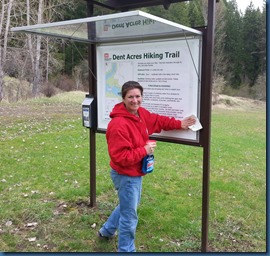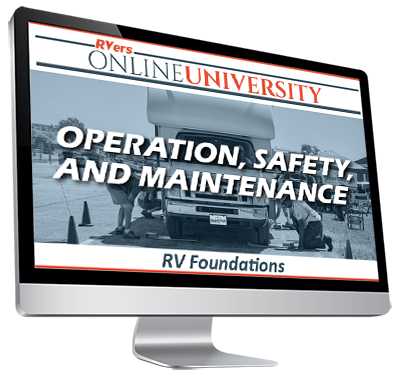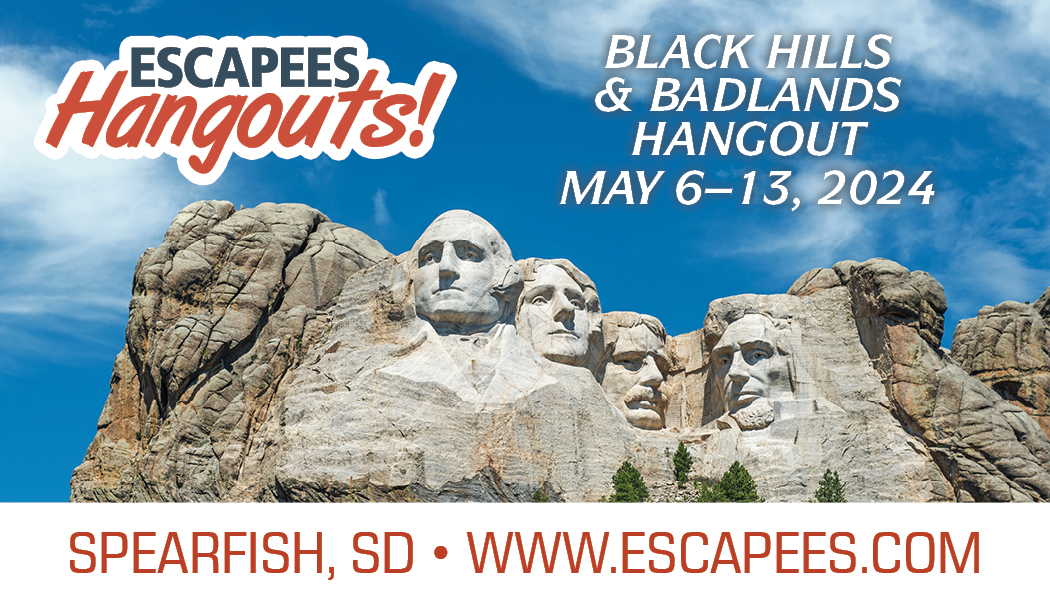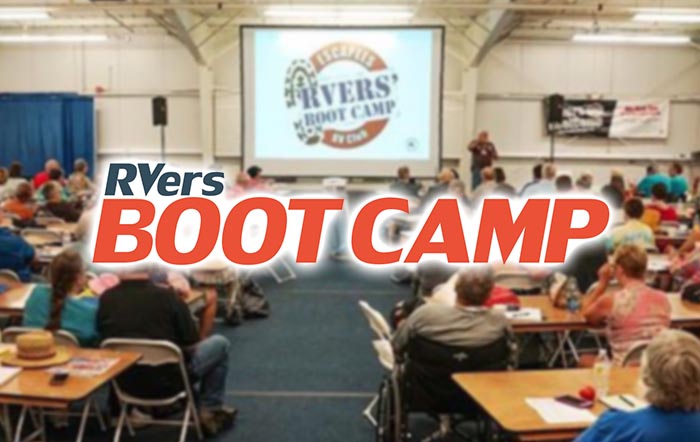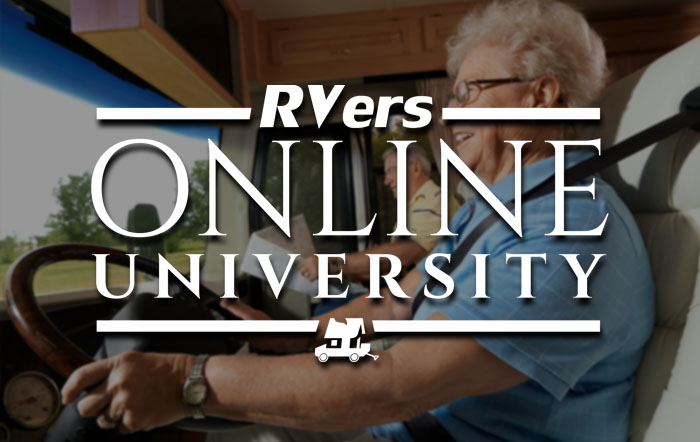Workamping has become a mainstay in our travel regime as a rewarding aspect to our full-time RVlifestyle with many benefits. Workamping allows us to stay in a place for an extended period of time and really get to know a town, occasionally brings in a little cash, saves on camping costs, and provides new opportunities that keep our minds and bodies active. 
Essentially, workamping is defined as RVers who work full or part-time jobs while living on the road. Which means you can do just about anything. Job opportunities range from working in retail stores, acting as caretakers on a private ranch, campground attendants, educational interpreters, and a host of other assorted jobs. A common misconception is that all workampers are retirees when in reality the median age is in the mid-50’s. This describes many younger people that want to travel but may be too young to draw a pension and are looking for a little income or free campsite.
Recently, we were asked how we choose our workamping positions – was it the job or the location? Hmm, this question started us thinking about how we really do choose!
Well, a lot of thought and research goes into deciding if, where, and when we want to work. Our initial approach is to find an area where we want to spend some time and then look for a job there. If you don’t like the place you are living you could be very unhappy during your stay. With job commitments of months instead of weeks it is important for us to be content with staying put in a place for that amount of time.
 |
| Bar Harbor Maine is a wonderful place to spend the summer which is why we are going back this summer. |
Of course, the job also matters and we give a lot of thought and discussion as to what job we want to apply for. For example, neither of us want to lead education programs for kids but we are happy to work in a campground store, drive a tram, fix trails, or be in a maintenance position. But that’s us. You decide for yourself.
 |
| As Camp Hosts in Idaho, our job duties were very diverse. One of which was working in the fee booth checking in campers. |
Our previous jobs ranged from working for a private RV park where we were paid for all hours worked to volunteering at a state park where our site was free in exchange for 30 hours/week/couple. And in the middle of that spectrum was a job with the Army Corps of Engineers in Idaho where our site was free in exchange for the hours we worked and they paid our mileage from our home state of Florida – which amounted to over $2,000!
We just finished up a three-month stint at Topsail Hill Preserve State Park in Santa Rosa Beach Florida. Our duties involved driving the tram back and forth to the beach, cleaning up campsite sites, checking to see that people departed their site before check-out time, emptying recycle bins, picking up trash, filling brochure boxes, assisting guests with kayak/canoe rentals, and other miscellaneous tasks. In exchange for our hours worked we received a free site and at a campground where the full hook-up site costs $46/night. That was quite the savings!


That job was ideal. We saved big on camping costs, loved the job, were in a place we really liked, and had wonderful fun coworkers and park staff. It was a WIN all the way around . . . and the reason we said yes to coming back next winter for four months.
But don’t think all jobs have to be in campgrounds. Amazon hires around the holidays to build up their work force for the busy season. Oil and gas companies need “gate guards” to keep a log of vehicle traffic at their sites. FEMA hires “Disaster Housing Inspectors” and gas companies hire RVers to find gas leaks. Retail stores in Yellowstone beef up their workforce for the summer season. Theme parks need people to operate the rides and take gate admission. Scooter rental companies need attendants. It seems like there is something out there for everyone.
So if you are considering work camping for the first time, here are some things to consider:
- Location and timing. Are you going to be working in an area you want to live? Is the job in a remote location and what time of year? Is that great job in Alaska for the winter or summer? We loved spending three months in north-central Idaho working on a 54-mile long reservoir with amazing views, hiking and fishing opportunities, but for many it would be too remote.
 |
| Our job in Idaho was in a small campground nestled along the 54-mile Dworshak Reservoir and surrounded by lots of wilderness. |
- Length of time. Is your commitment one month or six? A six month commitment for us is too long so we look for the shorter seasons say less than four months.
- Hours. Decide if you want to work 40 hours a week or scale back to less. We have never worked 40 hours a week and don’t really want a job that requires that because we like to spend time enjoying the surrounding area. If it is a volunteer job where your only benefit is your site you probably won’t want a 40-hour/week job.
- Job description. Before you sign up for a job make sure you fully understand the tasks you will be performing. Ask questions about the specifics of your daily tasks and what other duties may be randomly assigned. Many campground jobs require cleaning bathrooms. If you really don’t want to clean public restrooms, count that job out.
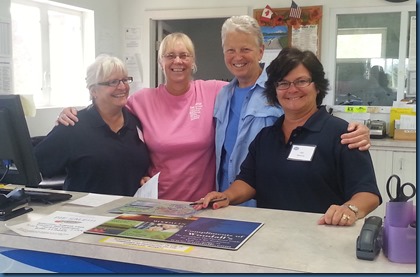 |
| Great people make for lots of on-the-job fun! |
- Your site. Will you have to pay for it or is it free? Are all the amenities you need/want there? There is one state park that we love in Florida but some of the workampers do not have sewer hook ups and for us that’s a deal breaker.
 |
| Our full hook-up campsite in Idaho gave us plenty of room and wonderful views. |
- Salary or other perks? Numerous jobs offer a hourly wage for hours worked. Our previous experience at a private park in Maine pays us for the hours we work whereas other jobs may just provide a free site. Consider if you want to earn a little extra income or are content with free camping. Do they offer free propane, laundry, firewood, cable, wifi, swimming pool, etc?
- Are you physically able to do the job? Working in an Amazon Fulfillment Center is a lot more physically taxing than driving a tram or welcoming guests in an office. Be honest with yourself about your abilities and capabilities.
- Check out reviews before you commit. Talk to other RVers who have worked at that particular location or find online resources such as WorkampingReviews.com.
Now that you want to work, how do you find a job? There are a variety of resources out there – some you have to pay for and some that are free. In the past, we subscribed to Workamper News where for $27/year you receive a comprehensive list of employers seeking employees and you can post your resume for employers to find you. This resource has been around for 28 years and has been very popular and helpful in finding jobs all over the country. If you are an Escapees member, there is a user-friendly job board on their website. This resource allows you to not only search jobs but to upload your information for prospective employers to view.
There are many free resources as well, including Volunteer.gov (which posts positions with federal agencies), Workers On Wheels, Recreation Resource Management, WorkampingJobs.com, CoolWorks.com, Camphost.org and many many more.
The bottom line is that workamping can be anything you want it to be as the job titles are an endless list. Consider all your options and do your homework before you agree to a job. Don’t shy away from workamping if you are a single. Many employers hire singles. In fact, this summer Betsy and I will do different jobs – she will work in the office at Narrows Too Camping Resort in Maine where she loves dealing with guest campers and I’m off to pursue my culinary passion. Just so we can be in Maine!
As we travel we look forward to continuing workamping and the new opportunities it provides and the places it takes us. If workamping is of interest to you, we highly encourage you to jump in and give it a try.

